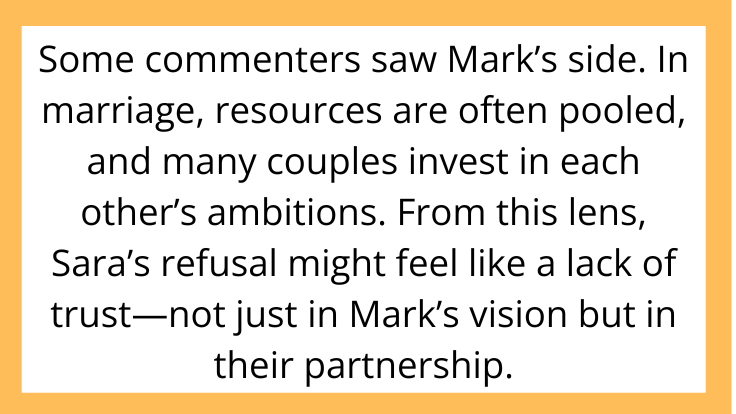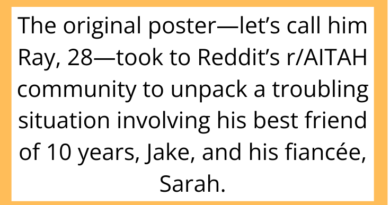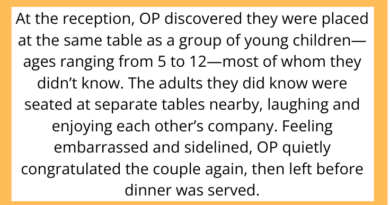AITAH for Not Letting My Husband Take My Inheritance to Start His Dream Business?
When money enters a relationship, even the strongest foundations can shake. In today’s AITAH-inspired story, we dive into a fiery marital conflict where a woman is forced to choose between protecting her late father’s inheritance and supporting her husband’s ambitious business idea. Is she being selfish—or just sensible?
Let’s break it down.
The Story: A Family Legacy at Stake

A 35-year-old woman—let’s call her Sara—shared her dilemma on the r/AITAH subreddit. A few months ago, Sara’s father passed away, leaving her a substantial inheritance. The money came with an emotional weight—it was her father’s life savings and a token of love for his only daughter. Sara had always intended to use it wisely: investing in a secure future, possibly putting it toward a home or saving for retirement.
Her husband, Mark, 37, had a different vision.
Mark had long dreamed of opening his own craft brewery. He had experience working in the industry but had never run a business himself. Upon learning about Sara’s inheritance, he saw it as the perfect opportunity. He asked Sara to invest nearly 80% of her inheritance to help him launch his venture.
Sara said no.
The Fallout: Love Meets Financial Reality

Sara explained to Mark that she wasn’t comfortable using such a large portion of her inheritance—money intended to honor her father’s legacy—on a risky business venture, especially one with no backup plan or safety net. She suggested Mark seek a loan or save over time to pursue his dream more sustainably.
Mark didn’t take it well.
He accused Sara of not believing in him and putting money above their relationship. He even implied that her father “would have wanted her to support her husband.” Their once-stable marriage quickly became tense, and Sara found herself sleeping in the guest room after one particularly intense argument.
Conflicted and hurt, she asked Reddit: AITAH for refusing to let my husband use my inheritance for his dream business?
The Arguments: Selfish or Sensible?

Team Sara: Boundaries Are Not Betrayal
Many commenters immediately rushed to Sara’s defense. They argued that inheritance is deeply personal—both emotionally and financially. Sara’s father left the money to her, not to “them” as a couple. That doesn’t mean she’s hoarding wealth; it means she’s honoring her late father’s wishes and protecting herself.
Moreover, investing in a high-risk startup, especially with no business plan or experience running a company, is financially reckless. The potential loss would be devastating—not just emotionally but practically.
One user put it best: “Supporting your partner doesn’t mean funding their dreams at your own expense.”
Team Mark: Marriage Means Shared Risk
Some commenters saw Mark’s side. In marriage, resources are often pooled, and many couples invest in each other’s ambitions. From this lens, Sara’s refusal might feel like a lack of trust—not just in Mark’s vision but in their partnership.
Mark may feel emasculated or excluded from a major financial decision, especially if he was under the impression that the inheritance would benefit them both. In some marriages, that’s the expectation.
Still, even these commenters acknowledged that Mark’s reaction was over the top and emotionally manipulative.
The Bigger Picture: Inheritance and Marriage Boundaries

This story surfaces a bigger, important question: Where do we draw the line between “mine” and “ours” in marriage—especially when one partner brings unexpected wealth into the picture?
Legal Perspective
In many jurisdictions, inheritance is legally considered separate property unless it’s explicitly commingled (like deposited into a joint account or used to buy shared assets). So technically, Sara was in the right.
Emotional Perspective
But marriage isn’t just legal—it’s emotional. Financial decisions often carry emotional weight, and when one partner feels shut out, it can lead to deep resentment.
That said, emotional manipulation—guilt-tripping someone into giving up their financial security—is a major red flag.
The Real Issue: Trust and Control

This isn’t just about money. It’s about how financial decisions reflect deeper dynamics in a relationship.
-
Does Mark respect Sara’s autonomy?
-
Is Sara expected to sacrifice out of obligation rather than choice?
-
Can a marriage survive if partners don’t see eye-to-eye on financial risk?
Sara’s refusal wasn’t rooted in malice—it was rooted in caution, love for her late father, and a desire to protect her future. Mark’s reaction suggests a sense of entitlement rather than collaboration.
What Should They Do Next?

For Sara:
-
Stick to her boundaries. Inheritance is personal, and she’s under no obligation to risk it.
-
Encourage open dialogue, possibly with a financial counselor or marriage therapist present.
-
Separate her finances further if necessary to avoid future conflict.
For Mark:
-
Reflect on why Sara’s “no” triggered such a strong reaction.
-
Consider alternative paths to fund his dream that don’t rely on Sara’s inheritance.
-
Work on building trust and avoiding guilt-based arguments.
Final Verdict: Not the Villain

Reddit’s consensus—and ours—is clear: Sara is not the villain.
Saying no to a financially risky request does not mean you don’t love or support your partner. It means you’re choosing long-term stability over emotional pressure. And that, in any healthy relationship, is not just okay—it’s essential.



